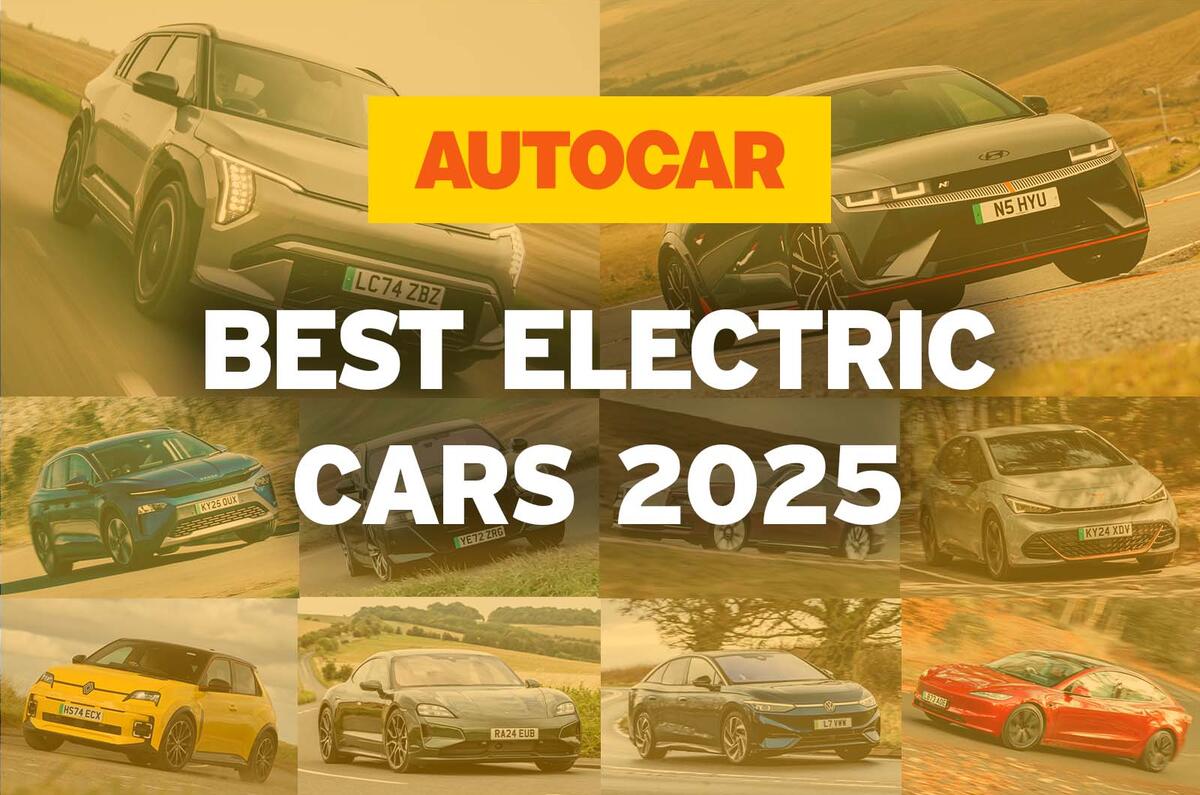The best electric cars – driven, rated and ranked
These are the best EVs on sale in the UK today in our view – each with its own trump card

News
by Sam Phillips
8 mins read
25 September 2025
Share
The speed at which electric cars have developed and improved over the past decade mean they’re a far more practicable ownership prospect than ever before.
With advancements in battery technology, charging infrastructure and driving dynamics, modern day EVs make a strong case for themselves as the go-to choice for families or fleets.
A broad spectrum of choice makes the EV buying process slightly more challenging, but to aid the process, we’ve put together a list of the best electric cars on sale today.
You’ll find the best EVs for range, performance, driver appeal and value for money. We’ve also considered the electric cars which nail the family car brief by optimising space and practicality, while also taking into account the models which offer the most up-to-date on-board tech.
We think that the Kia EV3 is a standout electric car and winner of our Best Electric Car Category at the annual Autocar Awards. Practical, affordable, and great value for money, the EV3’s encompasses all the hallmarks of a well-sorted electric car – the fact that it is good to drive makes it only more recommendable.
Want an EV that maximises space and practicality? You can read our best electric SUVs article. Need more whipcrack performance? Read about the best electric sports cars.
1. Kia EV3
9
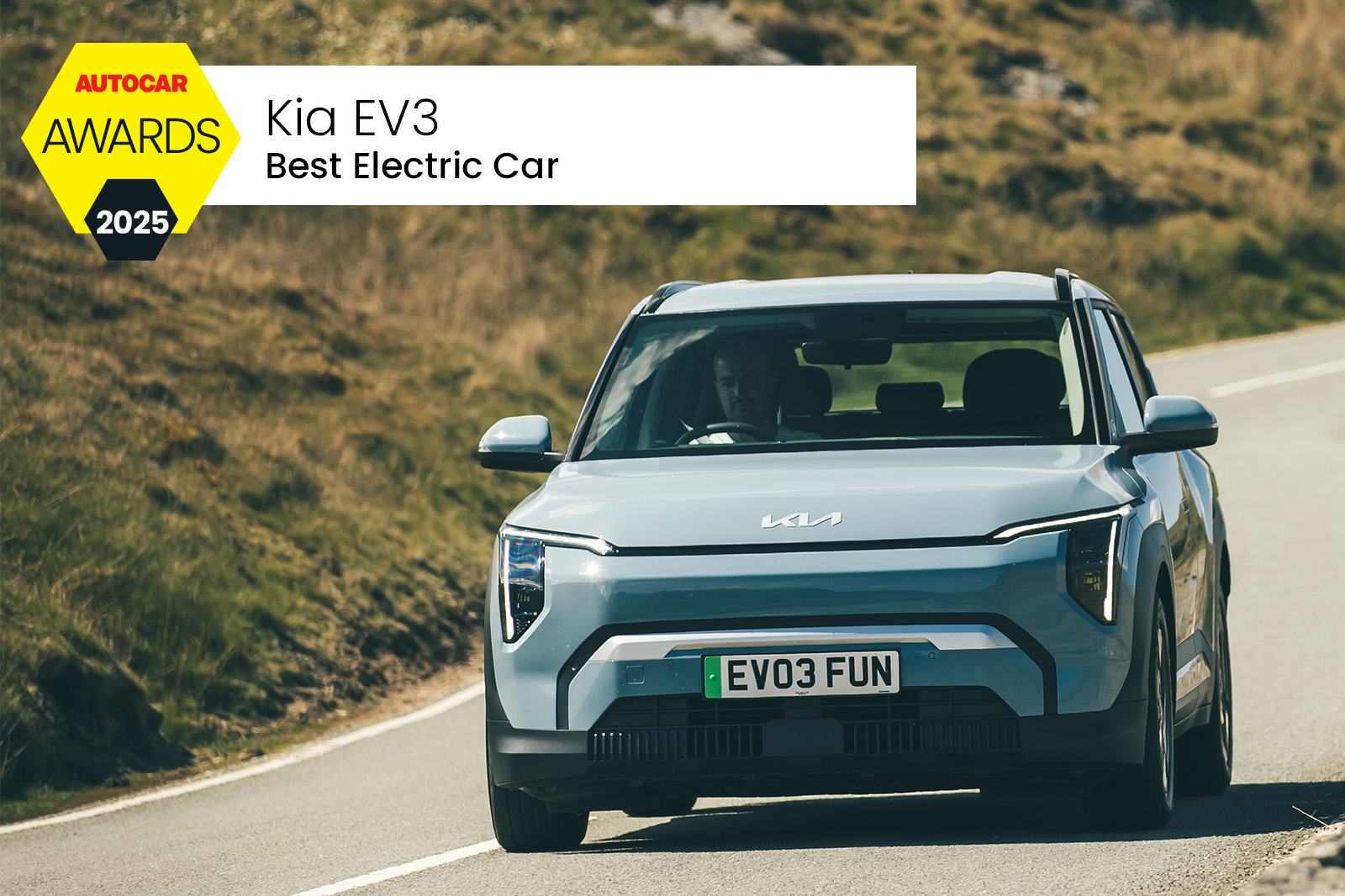
- Design8
- Interior8
- Performance8
- Ride & Handling9
- Costs9
Pros
Large battery for the class
Excellent infotainment and usability
Spacious
Cons
Awful ADAS
Bland to drive
Expensive on PCP
Best for: Daily life
The Kia EV3 is one of the most well-rounded electric cars for the average driver, and we’ve named it the Best Electric Car of 2025 at the Autocar Awards.
Although it’s not quite the game-changer it seems at first, the EV3 is still quite the achievement, and is making the class that bit more competitive.
It mixes practicality, performance, range and versatility in a reasonably affordable package and is the far more appealing option among its rivals.
Importantly, it’s a car with an atmosphere that would make those aged eight or 80 feel at home, and that’s a feeling many cars can’t achieve.
Its large, 81.4kWh battery outshines rivals, enabling a range of 375 miles, but the clincher is its price, which kicks off at just £32,215. It’s certainly a lot of car for the money.
Read our Kia EV3 review
Save money on a new Kia EV3 with What Car?
Latest Reviews

Mercedes-Benz G-Class electric review
7
Mercedes-Benz G-Class electric review

MG Cyberster
7

Nissan Leaf

Used Tesla Model Y 2021-2024 review
8
Used Tesla Model Y 2021-2024 review

Kia EV4
Read our review
Car review

Kia EV3
Kia amps up compact EV price war with long-range Cupra Born rival
Back to top
2. Hyundai Ioniq 5 N
10

- Design8
- Interior8
- Performance9
- Ride & Handling9
- Costs8
Pros
Terrifically adjustable handling
Exploitable drive modes
Strong straight-line performance
Cons
Not the most efficient EV
Quite large
Weighs 2.2 tonnes
Best for: Sports car thrills
The Hyundai Ioniq 5 N takes the Korean brand’s electric crossover and sends it into electric sports car territory.
The electric driver’s car has landed, and it will slot into most of our lives with ease.
Utilising a dual-motor powertrain, the Ioniq 5 N produces 641bhp and 549lb ft, hitting 0-62mph in a staggeringly fast 3.4sec.
Hyundai claims it will do 278 miles on a charge too, thanks to an 89kWh battery.
While it may feel heavier and much bigger than a traditional sports car, you can make it sound and feel like one.
It has an inbuilt sound generator that lets you select several different ‘engine’ notes, working in tandem with synthetic gearshifts.
A bit silly? Maybe, but it’s more convincing than any other high-performance EV we’ve tested in terms of bridging the gap between piston power and electric.
A landmark car? We think so, and a genuine driver’s car at that.
Read our Hyundai Ioniq 5 N review
Save money on a new Hyundai Ioniq 5 with What Car?
3. Cupra Born
9
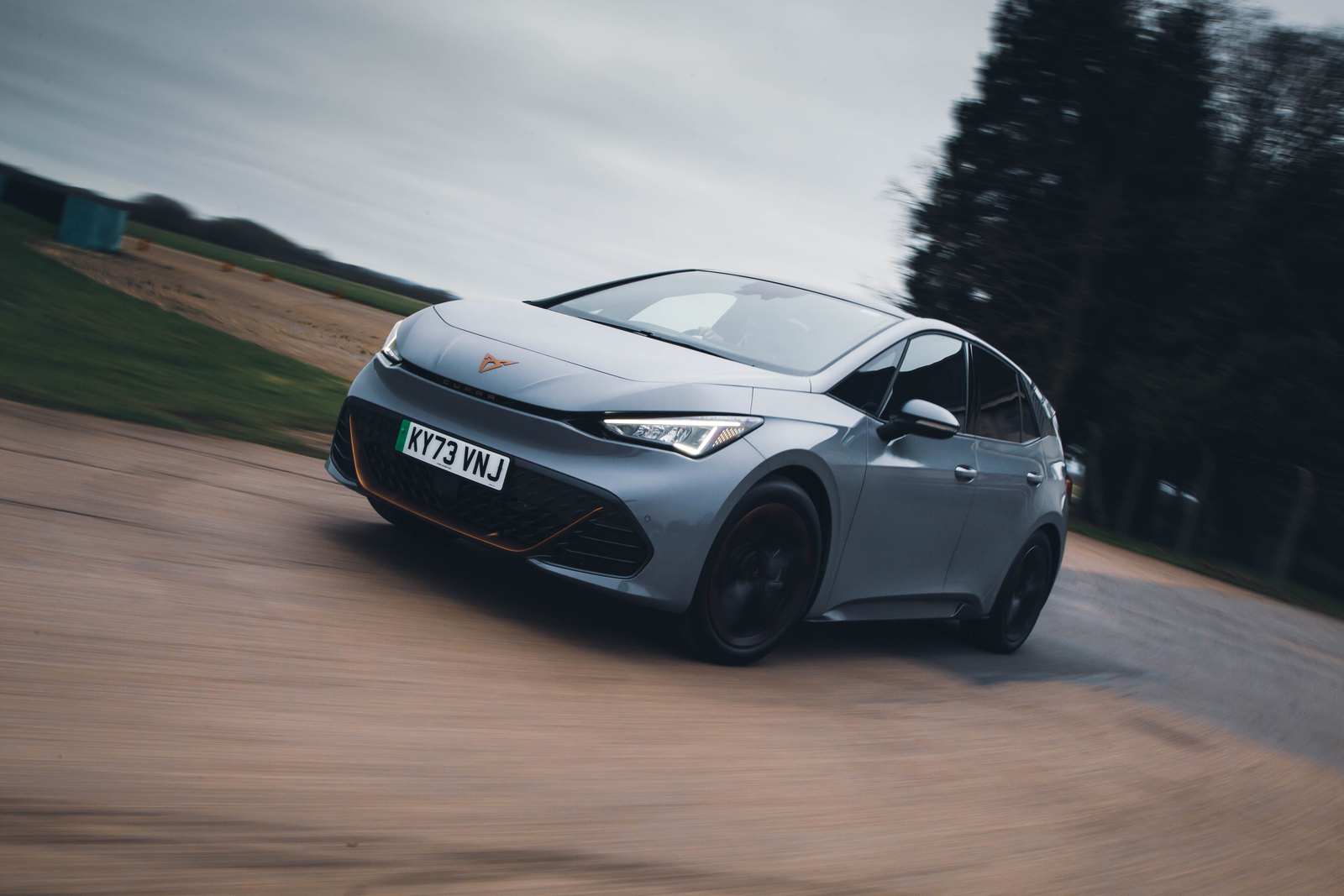
- Design8
- Interior8
- Performance9
- Ride & Handling8
- Costs9
Pros
Cleverly tuned chassis with good ride-and-handling balance
Rear-drive dynamics
Classy interior
Cons
Stability control can be too eager to intervene
Poor infotainment
Expensive
Best for: Overall completeness
For a couple of years now, Autocar has conducted an annual test of the best-handling, most fun, ‘affordable’ (it’s relative) electric cars on sale, and the Cupra Born is the reigning champion, beating rivals such as the MG 4 XPower and Abarth 500e.
It over-delivers on practicality and its rear-wheel-drive handling and ride are miles ahead of rivals’ efforts.
The Born sits at a compelling nexus of size and usability, weight and power, real-world range and price.
It has enough power to keep you interested but doesn’t seem excessive for the road or to compromise its efficiency in quicker motoring. It has an engaging, balanced, rear-driven chassis and some precision and purpose to its body control, but it also includes four usable seats and a decent boot.
The Born will also cover 220 real-world miles on a charge, which should be enough to get you to and from your favourite road, and it has the personality and poise to make the trip worthwhile.
There’s a completeness to the Born as a package that makes it the ideal affordable EV for interested drivers to take their first steps into zero-emissions motoring. Perhaps not by chance, it feels more like a Volkswagen Golf GTI for the electric age than anything that Volkswagen itself is making right now.
Plus, Cupra has also just introduced the Cupra Born VZ, a hot hatch version with 322bhp and 402lb ft. It will hit 0-62mph in 5.7sec, which is faster than the standard Born by more than a second.
Read our Cupra Born review
Save money on a new Cupra Born with What Car?
Back to top
4. Renault 5
9
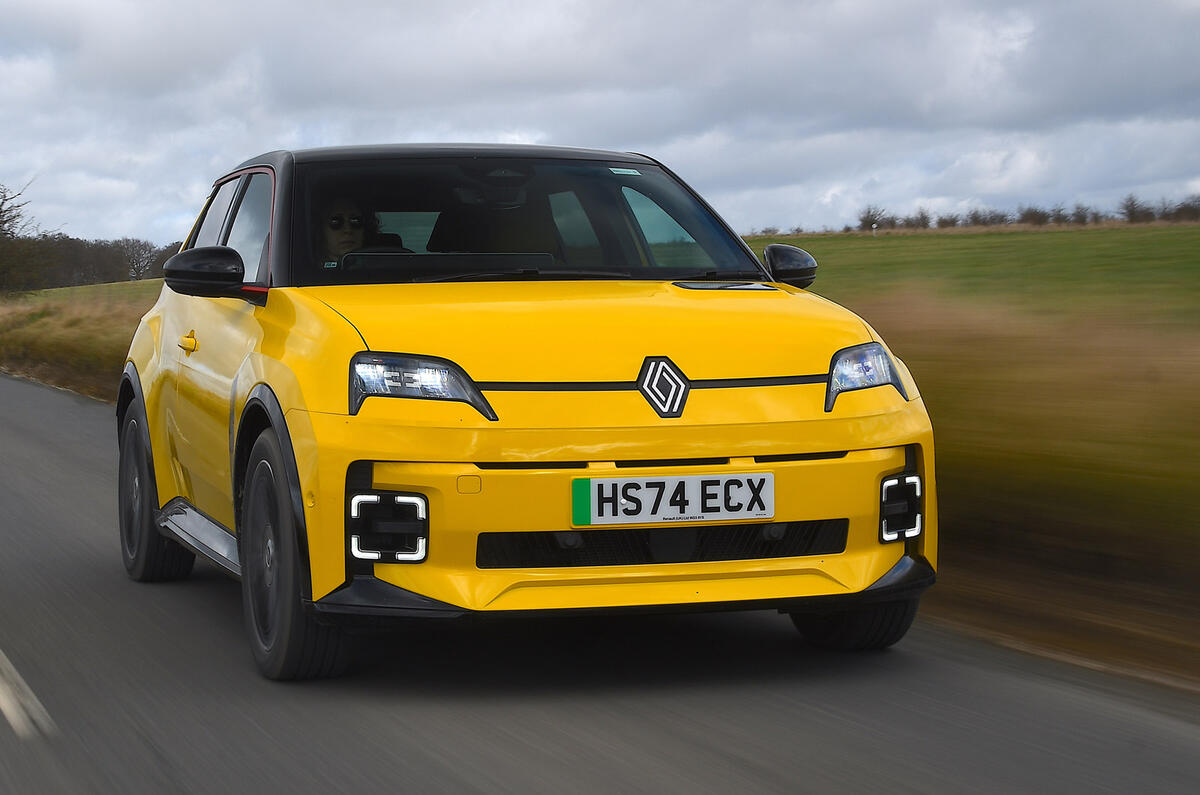
- Design10
- Interior9
- Performance8
- Ride & Handling9
- Costs8
Pros
Fantastic design, inside and out
Excellent value for money
Tech is simple to use
Cons
Disappointing efficiency at motorway speed
Tinny-feeling doors
Occasionally noisy suspension
Best for: Fun
What we have here is the standout electric supermini. The Renault 5 effortlessly blends retro design with modern technology and does it all at an affordable price.
The 5’s vertical body control is miles more settled than a Mini Cooper’s.
Inside, Renault has deployed colours and materials usually found in more expensive models, and it has all the latest tech, including Apple CarPlay and Android Auto.
It’s available with two different powertrains. The cheapest has a 120bhp motor and a 40kWh battery, while the more expensive has a 150bhp motor and a 50kWh battery. So more money equals more power and more range.
Efficiency is the name of the game with small EVs, and the 5 paints a curious picture. During our time with a long-range model, it returned 5.0mpkWh in our everyday test, giving a range equating to 260 miles, actually besting the WLTP range of 253 miles; but our motorway driving test sent its efficiency plummeting to 3.1mpkWh.
Read our Renault 5 review
Save money on a new Renault 5 with What Car?
5. Volkswagen ID 7
9
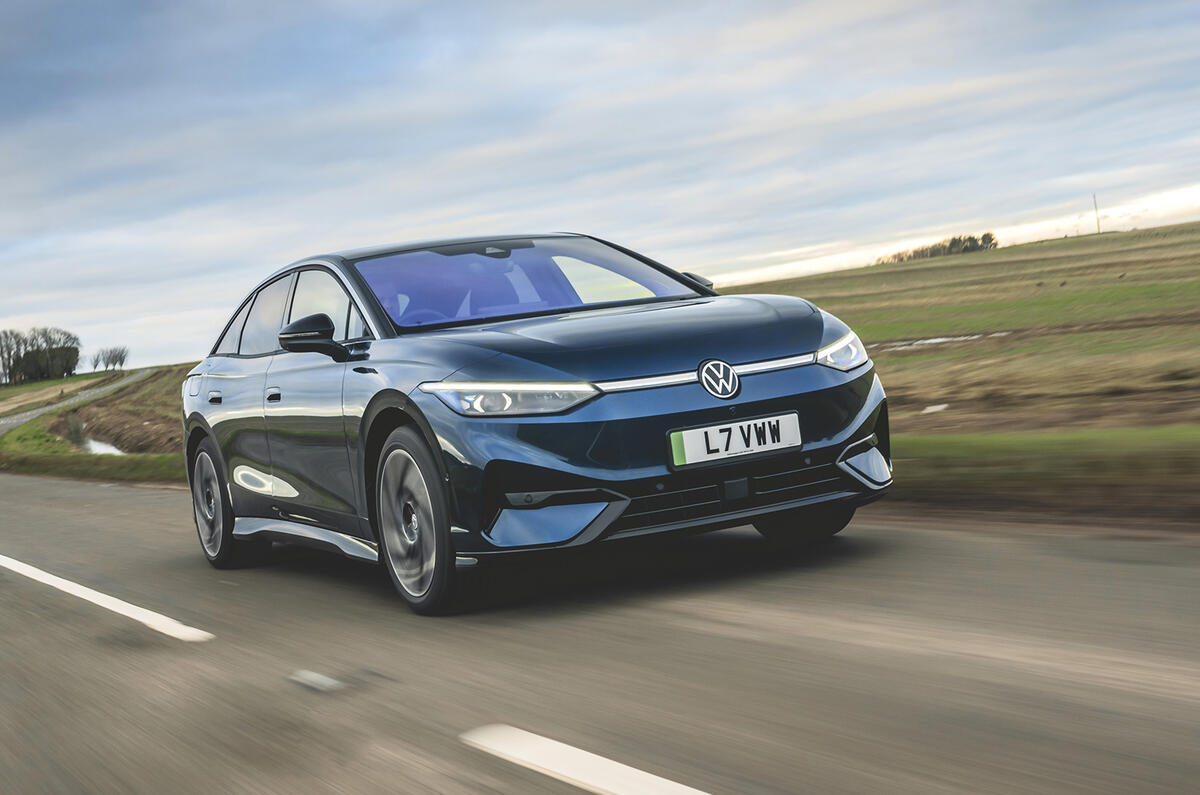
- Design9
- Interior8
- Performance8
- Ride & Handling9
- Costs8
Pros
The finest-riding electric car of any stripe at this price point
Extremely practical
Tidy handling and such easy drivability are old-school VW
Cons
Infotainment controls are improved but still frustrate at times
Not the most inspiring product in terms of subjective appeal
Traction control not perfectly smooth in wet conditions
Best for: Family appeal
There’s a lot to like about the Volkswagen ID 7, the German firm’s first electric saloon (and indeed the ID 7 Tourer, its first electric estate).
It rides very nicely indeed, handles with an intuitive ease that befits this style of saloon and is competitive in terms of the prosaic elements of EV ownership.
A good choice for drivers looking to drive longer distances, the ID 7 comes as standard with a single-motor set-up, producing 282bhp and 402lb ft.
Longer-range cars are equipped with an 86kWh battery that offers a range surpassing 400 miles, with maximum charging speeds of 200kW.
The ID 7 drives brilliantly for such a large, heavy car. It’s not quite as sporty as a Tesla Model 3 or a BMW i4 but is very well rounded. It feels agile, offers more than enough poke and grips well in the corners.
As for everyday practicality, the ID 7 possesses 532 litres of boot space and limo-like rear space. It really is the best in class in this respect, and the whole family will be comfortable.
Many of Volkswagen’s EVs have previously come under fire for poor material quality, but the ID 7 comes close to addressing most of these concerns, although the infotainment system is still frustrating to use and there’s still a distinct lack of the material richness possessed by other premium options.
Read our Volkswagen ID 7 review
Save money on a new Volkswagen ID 7 with What Car?
Back to top
6. Porsche Taycan
9
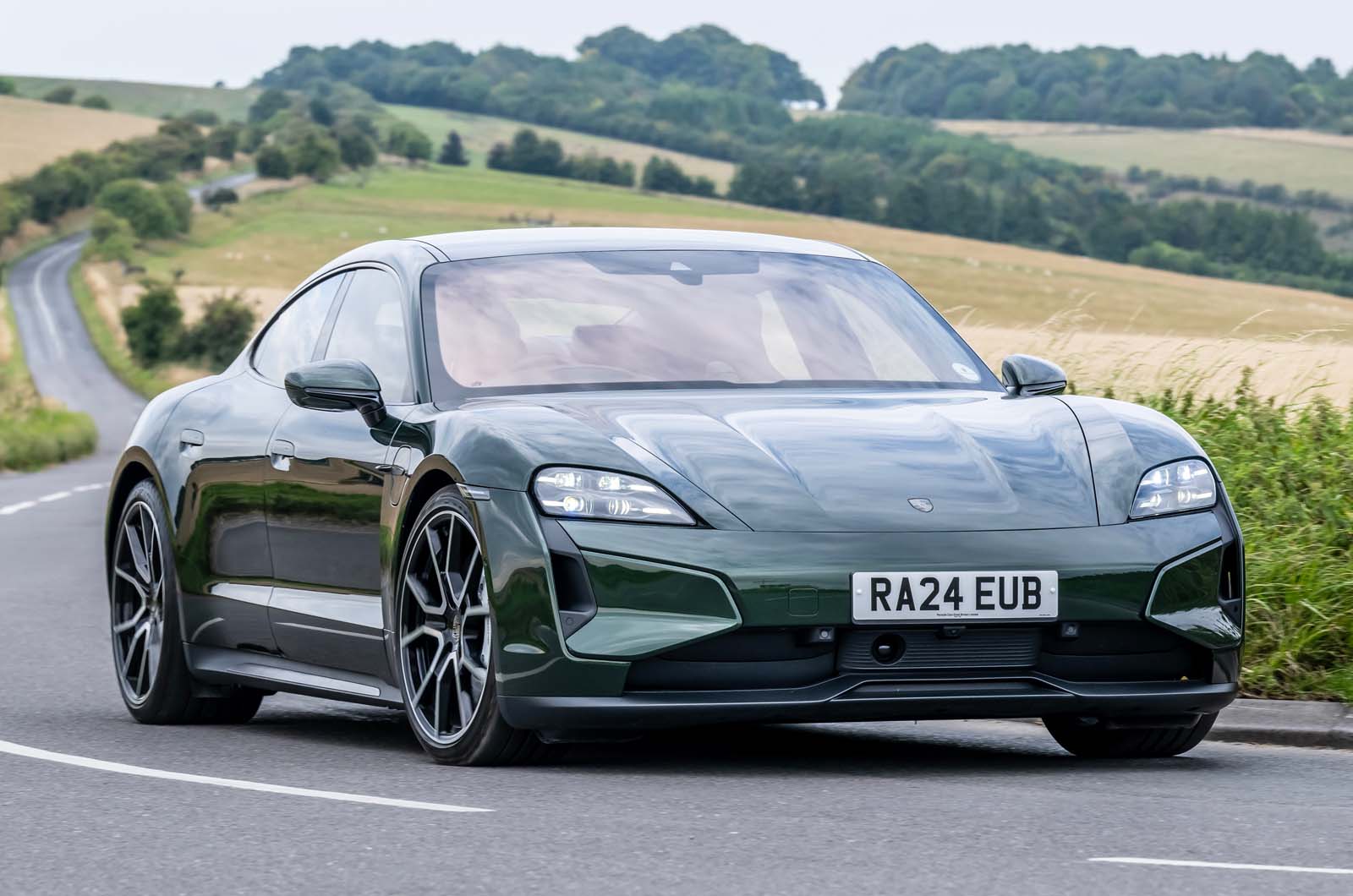
- Design9
- Interior9
- Performance9
- Ride & Handling8
- Costs7
Pros
Effortless agility
Wide selection of bodystyles
Big range
Cons
Expensive
Second-row seating is tight
Bigger than it looks
Best for: Handling
The Taycan, despite being an EV, still feels every bit a Porsche product.
More than its outright performance, I’m impressed by how nice the Taycan is to drive gently.
It deftly delivers close body control along with the perfect balance of communication in cornering forces, building up and abating in such neat, linear fashion.
It’s also devastatingly fast in a straight line. In full-fat Turbo S form, it will officially do the standard 0-62mph sprint in 2.4sec.
Range depends largely on which model you choose, but the biggest-battery option gives the Taycan an outstanding 422 miles on the WLTP combined test.
Our own testing of this model resulted in 3.7mpkWh, making for a real-world range of around 360 miles, which is very impressive for such a car with so much performance on offer.
Access remains quite tight for a luxury GT. Rear passenger space isn’t too generous considering the size, but the driving ergonomics are nothing short of superb.
Read our Porsche Taycan review
Save money on a new Porsche Taycan with What Car?
7. Rolls-Royce Spectre
9
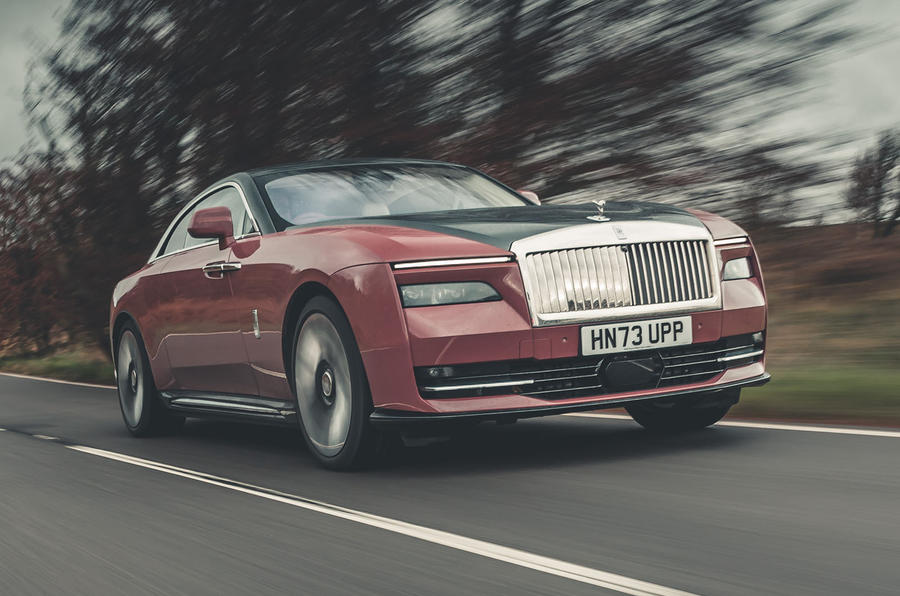
- Design10
- Interior10
- Performance8
- Ride & Handling9
- Costs4
Pros
Superlative refinement
Wafty ride
Blends familiar interior with EV tech
Cons
Sub-250-mile range in the real world
Low-speed ride isn’t perfect
Extremely expensive, obviously
Best for: Luxury
Charles Rolls noted the potential of electric motors for adoption in luxury cars right at the beginning of the 20th century, but it took the car company he co-founded 120 years to catch up with his embryonic vision.
Drive selection is simple and genteel: you do it with a column shifter. There are no regen paddles or Sport programmes.
Now that it has, though, and the super-luxury EV class has its first-ranking member, there can be no debate about which electric car comes first for luxury appeal.
The Rolls-Royce Spectre coupé has wowed us during test drives in the UK, South Africa and North America.
We’ve particularly praised its ride isolation and cushioned body control, even on its huge (23in) alloy wheels, the uncommon smoothness of its ‘one-pedal’ driving, its supreme, cocooning quietness and its unexpectedly rewarding steering and handling.
The Mercedes-Benz EQS limousine set a pretty high bar for low noise levels and lavish on-board feel, but for the best of the best where luxury is concerned and the ultimate sense of occasion, Goodwood’s experts still set themselves apart.
Read our Rolls-Royce Spectre review
Back to top
8. Tesla Model 3
8
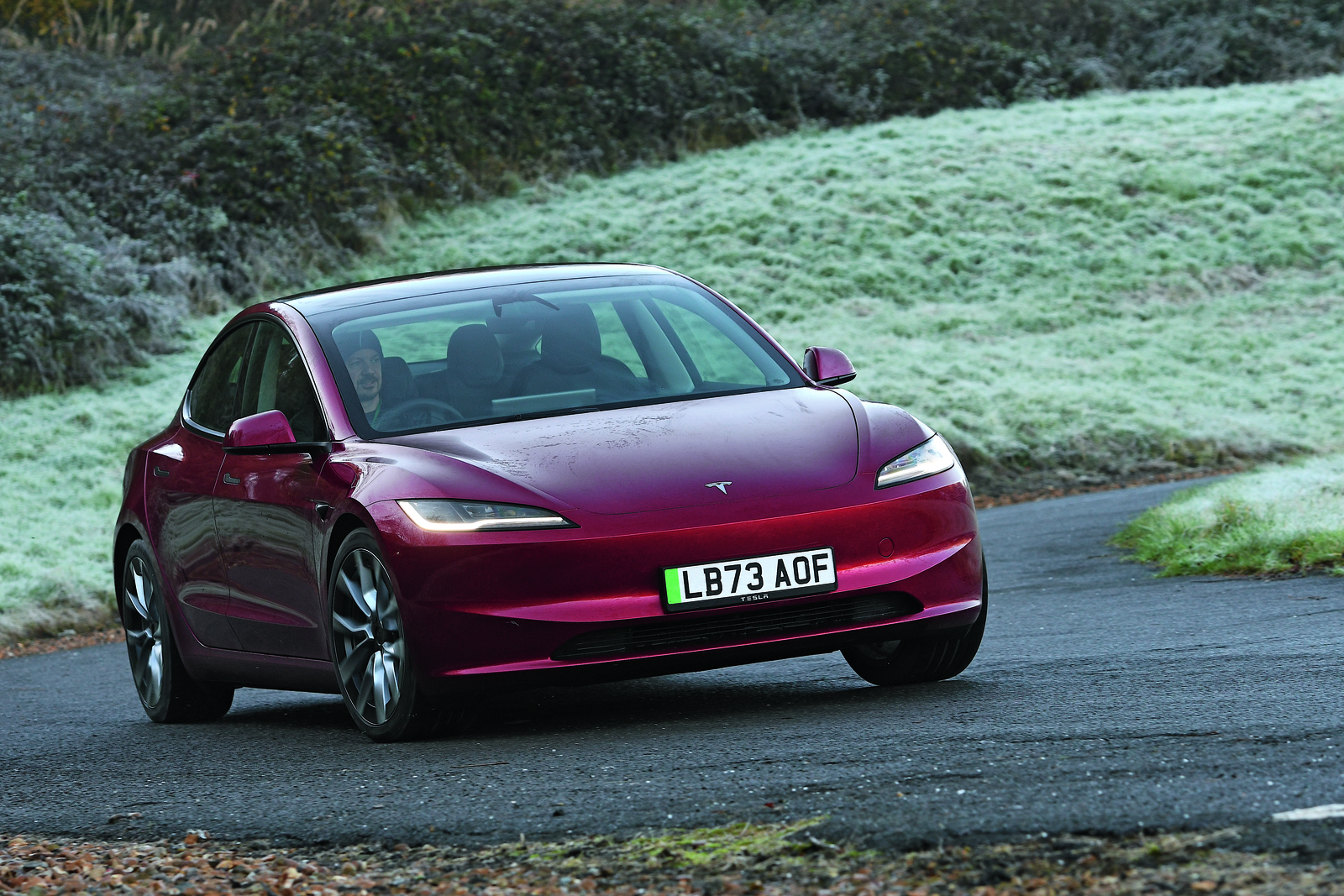
- Design7
- Interior7
- Performance9
- Ride & Handling8
- Costs8
Pros
Excellent performance
Great range
Quality of interior is much improved
Cons
Unsettled ride quality
Frustrating interior functions
Autopilot needs work
Best for: Long range
The Tesla Model 3 is still as hugely significant for the American EV brand as it has ever been, helping to spearhead its continued charge in Europe.
Even in its cheapest, lowliest form, this Tesla blends competitive saloon car practicality, striking performance and reasonable handling dynamism in a manner that makes it a fine all-rounder.
A great all-rounder, the compact saloon received a mid-life facelift in 2024, bringing with it a sharp design refresh, plus interior and technology updates.
Sensitive, direct steering is a huge draw for the Model 3, and it’s fun and engaging in most driving situations. A 0-60mph sprint of 4.4sec is rapid, and few EVs will match it for the same price.
Refinement and ride were weak points in the old Model 3, but this one improves things slightly. It’s still not as comfortable as it should be, but it’s far quieter than before.
Range has increased too. While the old Model 3 offered 254 miles in its entry-level specification, the latest car manages 344 miles. And the Long Range version does 391 miles, which is far ahead of several rivals.
Prices start from around £40,000, which remains competitive in a market that is increasing in size year-on-year.
Read our Tesla Model 3 review
Save money on a new Tesla Model 3 with What Car?
9. BMW i7
8
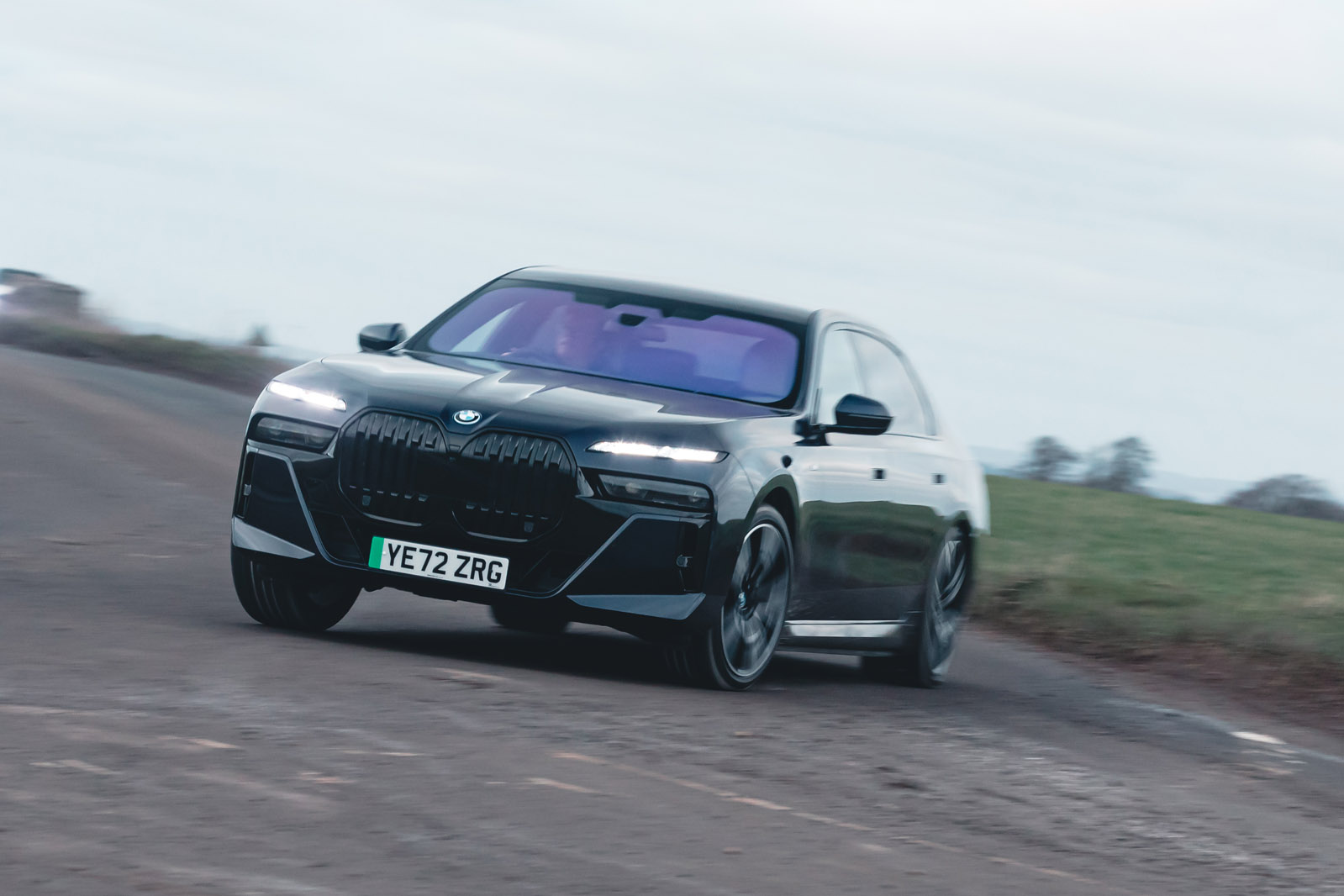
- Design8
- Interior7
- Performance9
- Ride & Handling10
- Costs4
Pros
Remarkable comfort
Impressive refinement
Cabin has space and tactile appeal
Cons
Design lacks sophistication
Sub-300-mile range
Expensive compared with competition
Best for: Comfort
A traditional long-legged limousine with one major change: an EV powertrain. The i7 is a BMW first and an EV second, in that despite its size and weight, it can still carve a line around a tight corner with absolute poise.
Just 63dBA of ambient noise at a 70mph cruise is very impressive indeed.
For drivers, the ambience is calming. There are clever designations of different leather and veneers, with secondary controls made out of cut glass.
In the back, meanwhile, passengers can sit in airline-style twin seats. Complete with ‘sleeping seat’ positions and individual screens. Then there’s BMW’s roof-mounted 31.3in 8K Theatre Screen too.
It’s more technologically advanced and more spacious than any BMW 7 Series before it.
Read our BMW i7 review
Save money on a new BMW i7 with What Car?
Back to top
10. Skoda Elroq
8
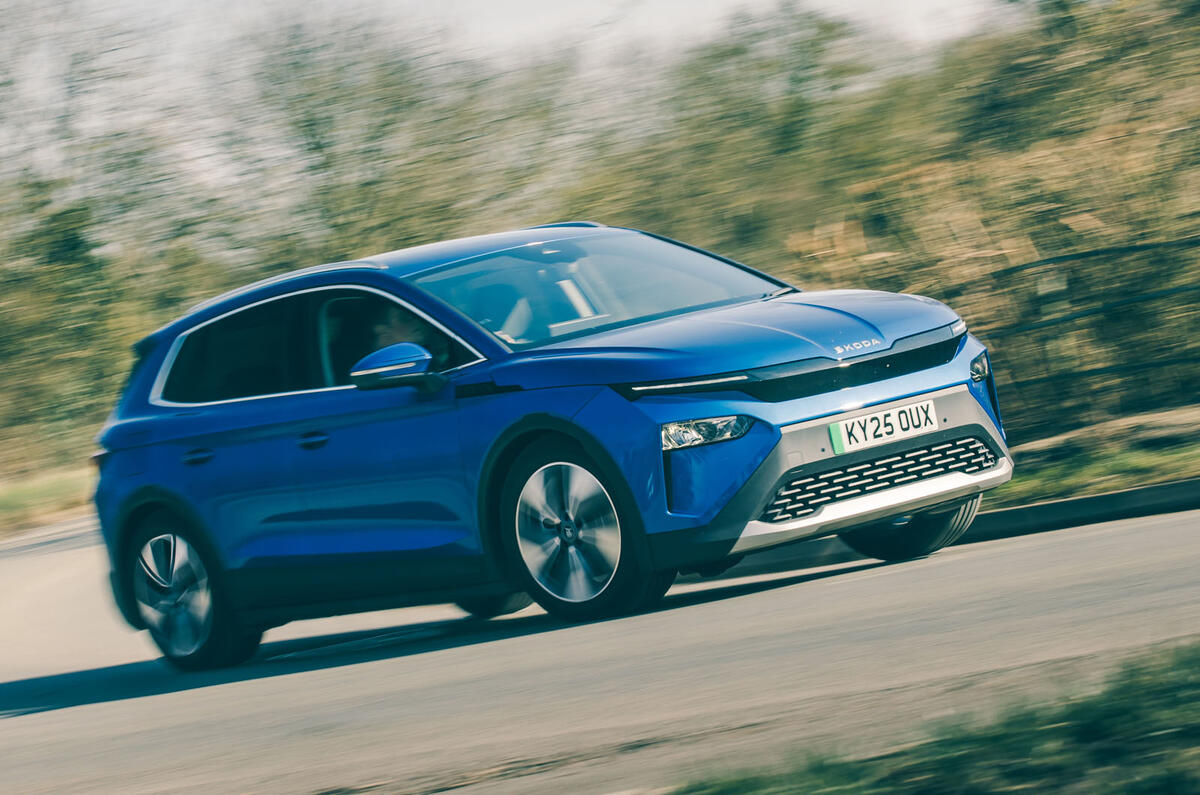
- Design10
- Interior8
- Performance6
- Ride & Handling7
- Costs6
Pros
Mature chassis and well-rounded drive
Spacious interior with easy-to-use tech
Strong real-world efficiency
Cons
Not the most engaging to drive
Feels heavy out of town
DCC suspension is needed – and tied to pricier models
Best for: Versatility
Four years ago, the Skoda Enyaq emerged as a comfortable, reasonably priced, well-conceived mid-size electric SUV.
It’s obligingly supple on typical dual carriageways and A-roads.
Ostensibly the Skoda Elroq takes that formula and reworks it into a smaller, cheaper model. Yet it also represents a shift in design philosophy, all while being assertively strong in all areas.
Inside, it’s massive. The boot is particularly useful and among the largest in class (although the Renault Scenic’s is bigger) and the storage is on point. For instance, you can keep the charging cables in an underboot cubby or the storage net in the boot, and the parcel shelf has multiple heights.
Adaptability also is high up on the list of reasons to buy. Top-spec models have a WLTP range of 360 miles, and even in our real-world testing 270-300 miles was easily achievable.



